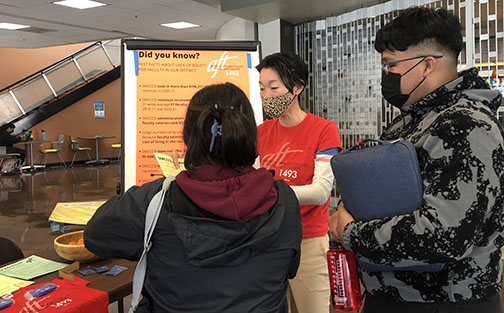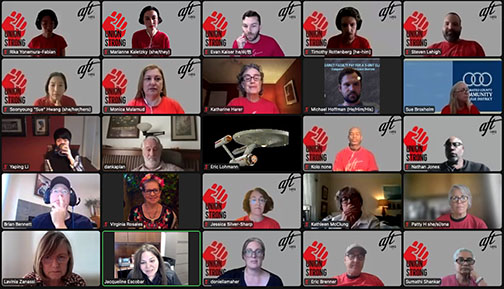Changes to SMCCCD Masking Policy
This Wednesday evening, the SMCCCD Board of Trustees voted on Chancellor Mike Claire’s policy for a new framework dictating when masks are required indoors at SMCCCD. Under Claire’s original proposal, indoor masking would be required when San Mateo County is in the red CDC community level and optional when the County is in the yellow and green levels. (San Mateo County is currently in the yellow level. Read more about the community levels here.)
AFT representatives attended the Board meeting to present data from the independent survey we took to gauge faculty perspectives on various potential masking policies. See the survey results here.
[Click here or scroll down to watch Marianne Kaletzky, AFT 1493 Executive Secretary, present data from AFT’s faculty survey on proposed district mask policy changes.]
In addition to presenting this data at Wednesday’s Board meeting, AFT also presented a representative sample of faculty comments on the survey, including comments both in favor of and opposed to the Chancellor’s proposal.
[Watch AFT faculty reps read faculty comments from the AFT survey.]
After hearing comments from AFT, CSEA, and SMCCCD students, the Board voted on the Chancellor’s initial proposal of making indoor masking optional at SMCCCD when the County is in the yellow and green levels. The proposal failed 3-2, with Board President Richard Holober and Trustee Tom Nuris voting in favor and Board Vice President-Clerk Lisa Petrides, Trustee Maurice Goodman, and Trustee John Pimentel voting against. Student Trustee Ashley Garcia cast an advisory vote against the proposal.
Chancellor Claire then presented a modified proposal requiring indoor masking in the red and yellow levels, with masks optional only when the County is in the green level. This proposal passed 3-2, with Holober, Nuris, and Petrides voting in favor and Goodman and Pimentel voting against. Student Trustee Garcia cast an advisory vote against the proposal. This masking policy will go into effect June 1, 2022.
AFT has issued a demand to bargain over the effects of the Board decision on faculty working conditions and plans to negotiate an MOU with provisions responding to the new masking policy. We will keep members updated on our progress towards an MOU. Thank you to all faculty who completed the survey. It was our honor to share your perspectives with the Board.
Watch AFT 1493 reps present data from AFT’s faculty survey on proposed district masking policy changes and read faculty comments from the survey:




